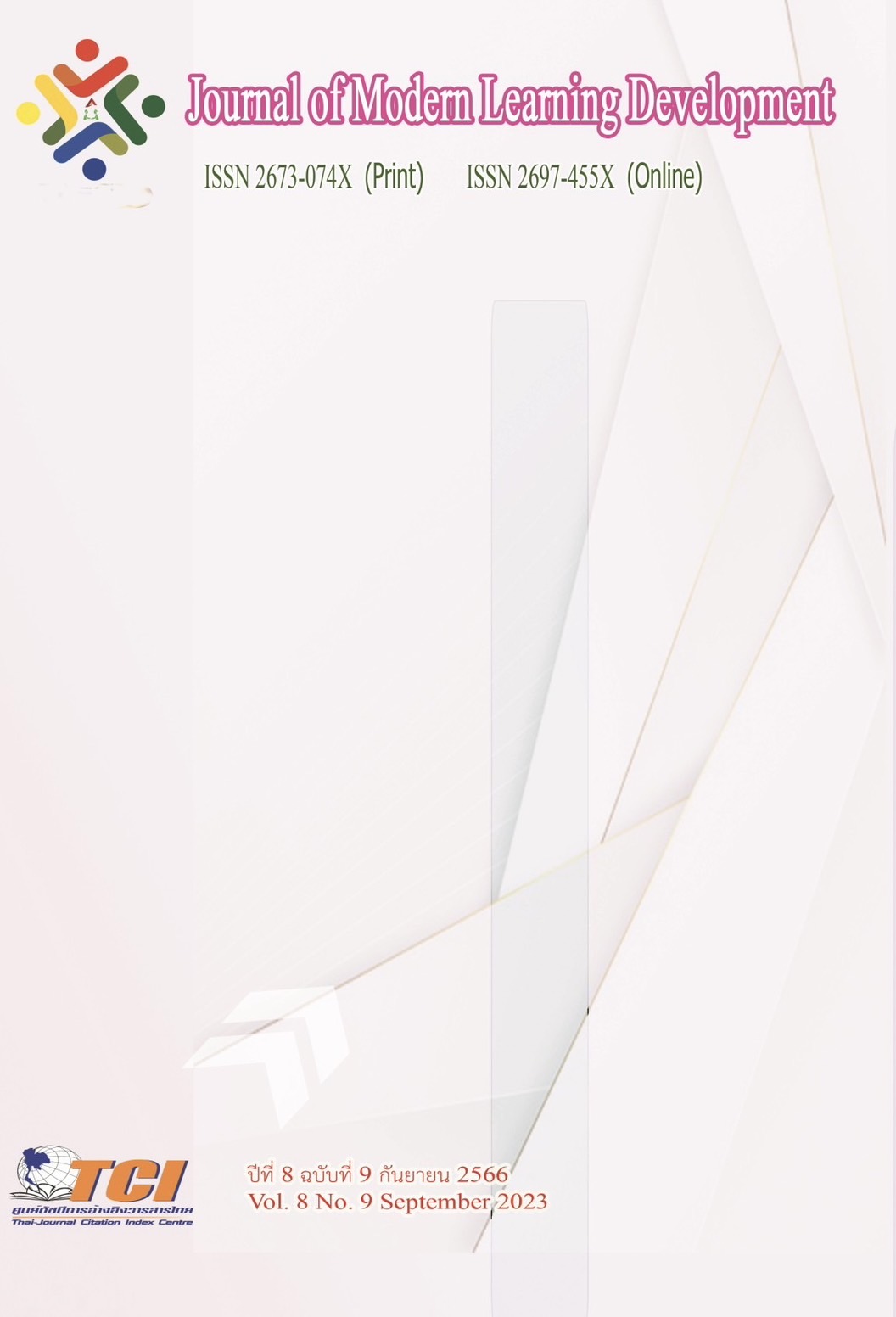The Effects of Online Phenomenon-Based Learning Activities with Questioning Techniques Affecting Critical Thinking for Grade 8th Students
Main Article Content
Abstract
The objectives of this research were to 1) design an online phenomenon-based learning activity with questioning techniques. 2) compare the pretest-posttest of critical thinking scores through online phenomenon-based learning activities with questioning techniques for grade 8th students. 3) compare the pretest-posttest of academic achievement through online phenomenon-based learning activities with questioning techniques for grade 8th students, and 4) study the satisfaction for grade 8th students toward the online phenomenon-based learning activities with questioning techniques. The samples were grade 8th students who studied in the first semester of the academic year 2022 in Chumphuang Suksa School, obtained by simple random sampling with a lottery method.
The results were found as followed: 1) phenomenon-based online learning activities with questioning techniques contains 7 steps in learning management. 2) the posttest of critical thinking scores through online phenomenon-based learning activities with questioning techniques of grade 8th students was higher than the pretest. 3) The academic achievement of grade 8th students after learning with phenomenon-based learning activities with questioning techniques after school was higher than before, and 4) The satisfaction for grade 8th students toward the online phenomenon-based learning activities with questioning techniques was at a high level.
Article Details
References
พงศธร มหาวิจิตร. (2562). การประยุกต์ใช้แนวคิดการเรียนรู้โดยใช้ปรากฏการณ์เป็นฐานร่วมกับการเรียนแบบเชิงรุกในรายวิชาการประถมศึกษา เพื่อเสริมสร้างทักษะการเรียนรู้ในศตวรรษที่ 21. วารสารศึกษาศาสตร์ มหาวิทยาลัยขอนแก่น. 42 (2), 79-90.
วริศรา เมืองจันทร์. (2563). การจัดกิจกรรมการเรียนรู้โดยใช้ปรากฏการณ์เป็นฐาน เพื่อพัฒนาทักษะการเชื่อมโยงคณิตศาสตร์ของนักเรียนชั้นประถมศึกษาปีที่ 5 เรื่องรูปทรงเรขาคณิต. ปริญาการศึกษามหาบัณฑิต กศ.ม. (คณิตศาสตร์ศึกษา). บัณฑิตวิทยาลัย: มหาวิทยาลัยนเรศวร.
สถาบันส่งเสริมการสอนวิทยาศาสตร์และเทคโนโลยี. (2562). ผลของโครงการประเมินนักเรียนร่วมกับนานาชาติ (PISA). ออนไลน์. สืบค้นเมื่อ 20 ตุลาคม 2565. แหล่งที่มา: https://kuza.me/cd0Pq.
สุกัญญา อิ่มใจ. (2548). การเปรียบเทียบผลสัมฤทธิ์ทางการเรียน เรื่องภูมิศาสตร์ประเทศไทย กลุ่มสาระการเรียนรู้สังคมศึกษา ศาสนาและวัฒนธรรม ชั้นประถมศึกษาปีที่ 1 ระหว่างการเรียนรู้แบบร่วมมือกันเรียนรู้ด้วยกลุ่มแบบ Stad กับแบบ Jigsaw. วิทยานิพนธ์ กศ.ม.มหาสารคาม. บัณฑิตวิทยาลัย: มหาวิทยาลัยมหาสารคาม.
สุวิธิดา จรุงเกียรติกุล. (2561). แนวทางจัดการเรียนรู้ในศตวรรษที่ 21. ออนไลน์. สืบค้นเมื่อ 20 ตุลาคม 2565. แหล่งที่มา: https://kuza.me/oM0Hb.
อรพรรณ บุตรกตัญญู. (2561). การเรียนรู้โดยใช้ปรากฏการณ์เป็นฐานเพื่อการสร้างมุมมองแบบองค์รวมและการเข้าถึงโลกแห่งความจริงของผู้เรียน. วารสารครุศาสตร์ จุฬาลงกรณ์มหาวิทยาลัย. 46 (2), 348-365.
Daehler, K. F., J. (2016). Making Sense of SCIENCE: Phenomena-Based Learning. online. Retrieved Octerber 20, 2022. from: http://www.WestEd.org/mss.
Seagren, A., and Watwood, B. (1996). The Virtual Classroom. online. Retrieved Octerber 20, 2022. from: http://ericir.syr.edu.
Symeonidis, V., and Schwarz, J. F. (2016). Phenomenon-Based Teaching and Learning through
the Pedagogical Lenses of Phenomenology: The Recent Curriculum Reform in Finland.
Forum Oświatowe. 28 (2), 31-47.
Valanne, E., Dhaher, R. A., Kylmalahti, R., and Sandholm-Rangell, H. (2017). Phenomenon
Based Learning Implemented in Abu Dhabi School Model. International Journal of
Humanities and Social Sciences. 9 (3), 1-17.
Watson, G., and Glaser, E. M. (1964). Watson-Glaser Critical Thinking Appraisal Manual:
From Ym and Zm. New York: Harcourt Brace and World.


